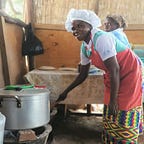The Death of a Charcoal Market
With MCHF support, local leaders are improving community law enforcement around the Mua-Livulezi Forest Reserve in Dedza district, Central Malawi.
Inkosi Kamenya Gwaza remembers what his father taught him about forests, “A forest is a friend to me like any other human being. Without the forest, our lives are affected.”
Despite what his father had taught him about the importance of forests, the Mua-Livulezi Forest Reserve, which overlaps with his Traditional Authority area, has suffered considerable forest cover loss over the past two decades. Inkosi Kamenya Gwaza governs an area that is home to 6,000 families, and many of them see the production of illegal charcoal as a viable business to support their families. Despite being illegal, charcoal is used by the majority of urban households as cooking fuel.
“They know that it is illegal, but people are not scared to go into the forest to cut down trees, make charcoal, and sell in the urban areas in Dedza or Lilongwe.” He adds, “There are only seven forest guards and rangers in the forest reserve. It is not enough.”
The Mua-Livulezi Forest Reserve in Dedza district, Central Malawi covers over 12,600 hectares or 126 square kilometers. The Forest Reserve was gazetted as a protected area in 1924.
For years, charcoal producers had a ready outlet to sell large bags of charcoal, which was harvested from the Mua-Luvulezi Forest Reserve. The Bembeke market, situated 8 kilometers southeast of Dedza town, gave travelers heading to Lilongwe easy access to obtain charcoal.
Nowadays, Inkosi Kamenya Gwaza is implementing major changes. In 2022, with support from his community, the Inkosi abolished the Bembeke charcoal market. Thanks to a public outreach strategy, there is more awareness about illegal forest activities among the communities around the Mua-Livulezi Forest Reserve. People understand that the production and selling of illegal charcoal constitute forest crimes and carry tough penalties.
“With local leaders, we came up with a suggestion to end the charcoal market at Bembeke because the market sits within my Traditional Authority area. We passed by-laws to make encroachers come out of the forest reserves,” says Inkosi Kamenya Gwaza.
The USAID and UKaid co-funded Modern Cooking for Healthy Forests (MCHF) project supports the Government of Malawi to strengthen community law enforcement to address illegal forest activities. MCHF provides technical support to local leaders, so they can continue to sensitize the communities living around seven forest reserves in Central and Northern Malawi. MCHF provides training and tools that help leaders and communities better understand the value of forests, creating ownership and incentives to take action against illegal forest activities like the production of charcoal.
“MCHF helped to bring stakeholders together and has equipped us with knowledge and the ability to bring back the forest. We have six forest blocks where people are working on a voluntary basis, experimenting with natural regeneration.”
-Inkosi Kamenya Gwaza
According to the Inkosi, people no longer encroach forested land for settlement or cultivation, and for the communities, regenerated forests bring back forest products, like fruits and mushrooms. The ecosystem services, like regulated water cycles, will positively impact the lives of their families.
Increasing Law Enforcement
Malawi’s growing population is increasing demand for forest resources. More than 96% of households rely on firewood and charcoal as their primary cooking fuels, and more than 75% of urban households rely on charcoal, which is the most significant driver of deforestation and forest degradation.
To enforce the new rules, Inkosi Kamenya Gwaza has empowered the Bembeke Community Police Forum to help address illegal activities like the production, transportation, and sale of illegal charcoal.
“To stop illegal charcoal flowing from the forest reserve, we had to first end the charcoal market at Bembeke.”
-Abel Benson, Chairperson for Bembeke Community Police Forum.
The 72-member Police Forum takes turns patrolling the forest reserve and areas just outside the reserve. Their role is to report and refer suspected offenders to Dedza Police Station. They also patrol the border area with Mozambique to ensure that no illegal contraband, especially charcoal gets into Malawi from Mozambique.
Benson and the team have managed to apprehend nine suspected illegal charcoal traders who were reported to Dedza Police Station for further investigation and possible prosecution. In addition, they seized a large truck, which ended up being forfeited to the government.
“We realized that illegal charcoal producers could easily escape the forestry officials when they tried to arrest them,” Benson adds.
The communities around the forest reserve are beginning to appreciate the importance of forests. Some of those who were involved in the illegal charcoal trade have found alternative trades including the selling of horticultural crops such as Irish potatoes.
“I am a farmer, I depend on the environment. I depend on rainfall. Rainfall depends on the environment. If the environment is destroyed, there will be no rainfall. This will negatively affect me as a farmer and my crops,” says Abel Benson.
Inkosi Kamenya Gwaza continues to shine and inspire other leaders who are learning from him on how he has managed to end the illegal charcoal market at Bembeke in Dedza.
Text and reporting by Eliam Kamanga
